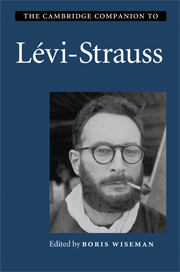Book contents
- Frontmatter
- Introduction
- Part I: Society and culture
- Part II: Myth and mind
- Part III: Language and alterity
- Part IV: Literature and aesthetics
- 13 Structuralism, poetry, music: Lévi-Strauss between Mallarmé and Wagner
- 14 Morphology and structural aesthetics: from Goethe to Lévi-Strauss
- 15 Structure and sensation
- Bibliography of works by Claude Lévi-Strauss
- Index
13 - Structuralism, poetry, music: Lévi-Strauss between Mallarmé and Wagner
from Part IV: - Literature and aesthetics
Published online by Cambridge University Press: 28 January 2010
- Frontmatter
- Introduction
- Part I: Society and culture
- Part II: Myth and mind
- Part III: Language and alterity
- Part IV: Literature and aesthetics
- 13 Structuralism, poetry, music: Lévi-Strauss between Mallarmé and Wagner
- 14 Morphology and structural aesthetics: from Goethe to Lévi-Strauss
- 15 Structure and sensation
- Bibliography of works by Claude Lévi-Strauss
- Index
Summary
Lévi-Strauss was characteristically sceptical about the prospects for a 'structuralist' analysis of literature. His sense, voiced in an interview in 1965, was that what passed for as much was frequently little more than a 'play of mirrors', in which the detection of invariant forms tended to give way to a fascination with recurrent contents, and the merely contingent was apt to trump the structurally 'necessary' (Lévi-Strauss 1973a: 323). In that critique of the specular, the reader recognises a tendency surfacing as early in Lévi-Strauss's work - and life - as his dismantling of Georges Dumas's delight, in the opening pages of Tristes Tropiques (1973c), at misconstruing a decayed and displaced vestige of his own French roots as an exotic essence of Brazil. Or perhaps the reticence vis-à-vis a structuralist analysis of literature should be understood in terms of the fundamental structuralist postulate of the arbitrary nature of the sign. If literature's deepest aspiration is to effect a fusion of sound and sense, a perfect adequation of one to the other, then there would be a fundamental dissonance between the structuralist and literary projects. As though structuralism might analyse literature in a manner congruent to Lévi-Strauss's 'analysis' of totemism - in order to dispel an ideologically charged mirage.
In his interview, Lévi-Strauss (1973c: 324) proposes as a guide to future thought on the subject the work of the art historian Erwin Panofsky, said to be a 'great structuralist', and to be so precisely to the extent that he was simultaneously a 'great historian'. The gesture may surprise on the part of an author frequently labelled an unrelenting polemicist against the pretensions of history, but it is in many ways characteristic.
- Type
- Chapter
- Information
- The Cambridge Companion to Lévi-Strauss , pp. 257 - 274Publisher: Cambridge University PressPrint publication year: 2009

